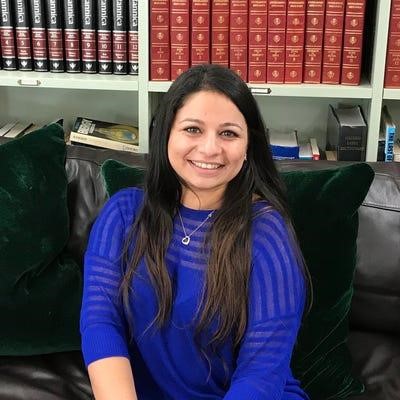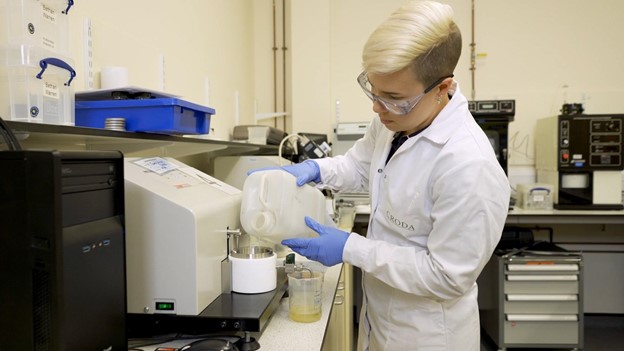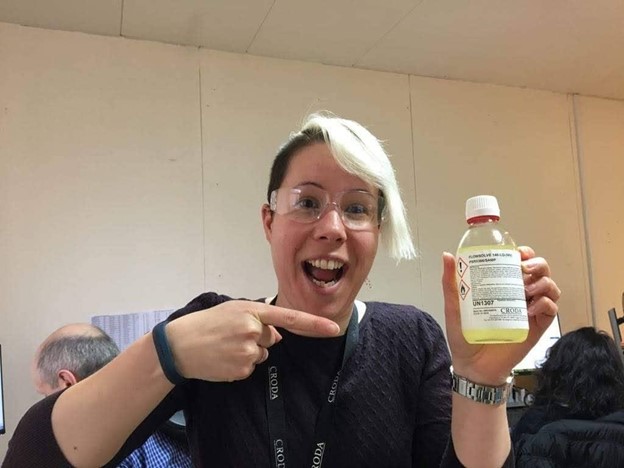Suze Kundu’s career has taken her from nanochemistry to science communication and even to presenting TV shows on the Discovery Channel. So, how did she go from academic to Head of Public Engagement at Digital Science, and what advice does she have for those looking to follow in her footsteps?
You’ve had a really varied career path. How did you get to where you are today?
Varied indeed! I categorise my career into two strands – doing science, and communicating science. And I’ve done both alongside one another for over a decade now. The former UK Chief Science Officer, Professor Sir Mark Wolport, once said that science isn’t finished until it is communicated. This is something that my alma mater, UCL (University College London) not only believes, but also supports.
Given that research is largely publicly funded, researchers owe it to the public to communicate progress and outputs. By creating opportunities for dialogue, this communication becomes a two-way process, which also benefits researchers who can conduct better-informed research that will help more of society.
As such, I was trained in being both a researcher as well as a public engagement practitioner during my undergraduate degree and during my PhD. I’ve been really lucky to have been able to keep both strands of my career running either concurrently or in combined roles. When I was an academic, I would do research, teaching and public engagement as part of my varied day job, and I also kept up with my science writing and TV presenting in my spare time. I now work at Digital Science, which is a research technology company that creates mostly software solutions for different aspects of the research cycle to help it be the best it can be.
At Digital Science, I headed up Engagement for three years, before recently moving on to a role that combines my engagement skills with my chemistry knowledge and my unashamed fangirling over our flagship platform, Dimensions, to support our newest addition to the family: Dimensions Life Science and Chemistry.
All of our software solutions are created with the research community in mind, and are often developed and refined in collaboration with actual users, so we know that our tools can help people overcome research challenges.
What personal challenges have you faced and how have you overcome them?
Thanks to my parents, my school and my university, I grew up fairly sheltered from a range of ‘-isms’ that may have resulted in my being put off a career in science. Being a woman, a woman of colour, and a woman who perhaps doesn’t conform to outdated stereotypes of what ‘scientists’ are like are all things I learnt can be hurdles to overcome in my career.
In many ways, I was glad that I had no idea that academia, for example, was such a challenging environment for underrepresented people, as I am not sure I would have pursued a career in it if I had known. Women in academia are often assigned teaching that covers the basics, and are frequently given tasks that require so-called ‘softer’ skills such as outreach, engagement and the admissions process. In a world where women have to work twice as hard to get half the recognition, this can often lead to burnout.
I did two things to overcome these challenges once I had identified them; firstly, I had some great allies that came to my aid. They helped me objectively highlight the inconsistencies in workload and expectations, and they were always on hand to offer advice to help me overcome hurdles. Secondly, I chose to leave academia for industry. I now work in an organisation where all the diverse facets that make up an individual are respected and welcomed.
My advice would be that, if you think a science career isn’t for you, you may not have found ‘your people’ yet. I assure you, though, that scientific careers are so much broader than just academia and traditional industry roles. Keep looking and use your networks to find your type of organisation, as I can guarantee that they’re out there somewhere.
Suze Kundu
You’re very skilled at communicating complicated topics to non-specialist audiences. How do you do it?
I was lucky enough to attend UCL for my undergraduate and PhD. UCL has a long history of engagement with a range of communities. It is thanks to opportunities I had during my degrees there that I started to really hone my communication skills.
Strangely enough, I think my acting, drama, dance and musical theatre skills have also played a part in building my skills, as there is always an element of performance in everything that we do. You need to know your audience, and know what motivates them, to really engage with them.
I do believe that everyone can learn and develop communication skills though. I’m not saying everyone needs to present evidence in a parliamentary inquest. There are so many different ways to communicate research, whether it is through writing, drawing, even music and dance.
It could even be as simple as just engaging with your PR team to find support in sharing your research more broadly. It’s a really collaborative space though, so if you want to give it a go or learn more, find some people whose communications style you like and get in touch. If they’ve got the capacity I’m sure they will either be able to help, or at least point you in the right direction.
Which mentors have helped you along the way?
Firstly, my parents, who made me believe that I could pursue anything I wanted to and they’ve been nothing but supportive. My husband is also totally wonderful, even though he wishes I worked more sensible hours. Secondly, I have a set of amazing friends that remind me that I can do things, even when I doubt myself.
Finally, there are some amazing heroes-turned-allies out there that have supported me along the way. My top four would be my ever-supportive PhD supervisor Professor Ivan Parkin at UCL, my old chemistry teacher Mr Brian McVicar, my science communication hero Professor Mark Miodownik at UCL, and my academic role model Professor Mary Ryan at Imperial College London. Our CEO at Digital Science, Dr Daniel Hook, is also an inspiration and an example of having both a career in enterprise and leadership, AND a career in academia.
>> Read about Dr Anita Shukla’s groundbreaking work in treating infection and developing drug delivery systems in our interview with Dr Shukla.
What is the current state of play within your sector with respect to equality, diversity, and inclusion – and is enough being done to attract and retain diverse talent?
In academia, my experiences have not been great. We spend a lot of time, money and effort recruiting a more diverse range of people into science degrees but very little time retaining those people in the profession.
Though things are improving, changing an entire culture is slow going, and I think academia is still fundamentally built on a framework that rewards and promotes cultures and behaviours that do not allow for inclusion.
We have a long way to go to breaking down those barriers to inclusion. We’ve worked with a range of actors in the research industry through the Research on Research Institution (RoRI), but culture change takes time. It requires buy-in at all levels and globally across the profession, as well as a lot of resource to build a better framework of recognition and reward to encourage inclusion and retention within the academic profession.
In industry, I think we are in a much better place in terms of equality, diversity, inclusion and accessibility, though there are of course still challenges that need to be overcome. Organisations have more control over how they nurture their employee communities, and I think it can therefore be easier to see changes in culture sooner than in academia.
There is still a long way to go to make things as inclusive as they can be, and to achieve real representation of society in industry, but by working with underrepresented communities we are able to co-create initiatives that will hopefully change things for the better.
Is there any advice you would give to young professionals looking to pursue a career path similar to yours, especially young women?
Do it! Science is such a rewarding profession, and so varied too. You’re able to combine your passion for science with your interest in a whole host of things. Do, however, be aware that you may not immediately find an environment that can support and nurture you in a way that works for you. They are out there though, so keep networking, keep looking, and be your truest self. You’ll find your people soon enough, and from there on in, it’s a great adventure.
Don’t be afraid to try things. You may well surprise yourself and start a career journey down a path you didn’t expect to find yourself on. And remember, no experience is wasted. Your skillset is always building up, and you’ll find yourself applying experiences and knowledge in ways you never expected you would.
Find a mentor or a range of mentors for different aspects of your career, and consider being a mentor for others too. You have a remarkable amount of knowledge and experience to share with others too.
>> In recent months, we’ve spoken to inspiring women who work in science. Read more about the stories of materials scientist Rhys Archer, EPSRC Doctoral Prize Fellow and founder of Women of Science, and Jessica Jones, Applications Team Leader at Croda.
Edited by Eoin Redahan. You can find more of his work here.
Continuing our profiles of Black scientists, Dr Jeraime Griffith, Chair of SCI’s Agrisciences Group, shares how a simple classroom experiment set him on the journey that has led to him analysing complex data to safeguard UK food security.
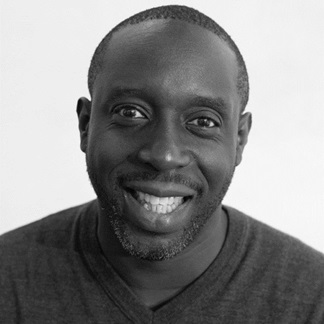
I am a Data Scientist building tools that maintain, forecast and predict threats to the UK’s food security.
Right: Dr Jeraime Griffith
What was it that led you to study chemistry/science and ultimately develop a career in this field? Was this your first choice?
At about age 10, in primary school, I had a teacher who explained to us how the human digestive system and saliva break down starch into sugars. To demonstrate this, he got some bread from the school kitchen and asked us to chew it until we started noticing a slight sweet taste. I decided then to be a scientist. This wasn’t my first choice however. Prior to that moment, I wanted to be a pilot.
Was there any one person or group of people who you felt had a specific impact on your decision to pursue the career you are in?
My parents were super supportive. After announcing that I wanted to be a scientist, I got a science dictionary for my birthday. I also had great teachers, both at primary and secondary school. At 13, we were doing hands-on chemistry experiments and helping to tidy the lab at the end of the school year.
Could you outline the route that you took to get to where you are now, and how you were supported?
Following a BSc and a PhD, both in chemistry, I worked for ChemOvation, Argenta Discovery (now part of Charles River Laboratories) and briefly at Novartis. I then went off to New Zealand for a two-year postdoc at Massey University in early 2009 to work with my former PhD supervisor who had relocated there.
On returning to the UK, I worked at Imperial College London, first at the Centre for Synthetic Biology, then over in Chemistry with Professor Tom Welton. It was towards the end of my time with Professor Welton that I began learning the programming language Python, which led me to data science. I’m now a Data Scientist at Cognizant, working with the Food Standards Agency.
I was fully supported, both in industry and academia, but it was in academia that I was afforded the freedom to explore my interests – particularly to use 20% of my time to do whatever I wanted.
Jeraime helps safeguard UK food security and Chairs SCI’s Agrisciences groupConsidering your own career route, what message do you have for Black people who would like to follow in your footsteps?
Allow some flexibility in pursuing your career. When I was questioning myself and my goals, I came across ‘Obliquity’, a book by John Kay. Sometimes diversions are the best way to get to your goals.
Seek out mentors, and I would say regardless of race, who can help you get there. Don’t be afraid to email them and briefly talk about your interest in the work they’ve done, what you have done and are doing now. I’ve found people are genuinely interested in helping you. This is how I learned about the Agrisciences group at the Society for Chemical Industry, which I joined and now Chair.
As for getting into data science, I did a 13-week intensive bootcamp. These are not for everyone as they are expensive and have a high demand on your time. However, there are a lot of free courses available. With this availability, it can be hard to find the good ones. The knowledge of the crowd can help. I’ve found Twitter to be our modern day equivalent to Ask Jeeves.*
What do you think are the specific barriers that might be preventing young Black people from pursuing chemistry/science?
Lack of representation I think is the number one barrier. Impostor syndrome is bad at the best of times, but worse still if there’s no representation in the ivory tower.
What steps do you think can be taken by academia and businesses to increase the number of Black people studying and pursuing chemistry/science as a career?
Recruit people of colour with less experience to positions of responsibility. Trust us to perform and have the support in place when we falter.
The experience that most defined Jeraime’s career path… a great teacher
Science is at the centre of addressing many of the big global issues. Do you hope that this will lead to more young Black people wanting to get involved in science and develop solutions?
Yes. A low entry point is data science. Most of the tools we use are open source. Data for your area of interest are, for the most part, freely available and the data science community is helpful and engaging.
Could you share one experience which has helped to define your career path?
Where I am now began in that class in primary school when I first learned about the human digestive system. So, my defining experience would be having a great teacher.
*Note from the editor: Some youngsters may need to look up what Ask Jeeves is!
Edited by Muriel Cozier. You can read more of her work here.
Our careers often take us in unforeseen directions. Dr Jessica Jones, Applications Team Leader at Croda, chatted to us about moving from research into management, the benefit of developing softer skills, and her unexpected mentor.
Tell me about your career to date.
I came through university in what is probably seen as the ‘traditional’ way. I did a Master’s degree in chemistry at the University of Liverpool, with a year working in industry, which I really enjoyed. And then after I finished my Master’s, I did a PhD in Inorganic Chemistry at the University of Nottingham. I always wanted to work in industry, but I really enjoyed research, so I decided to do the PhD as I thought the skills would be useful for either career path.
Jessica Jones in the lab
Were you tempted by a career in academia?
No, I never felt like I was the kind of person who had what it takes to succeed in academia. I never felt like I could ever come up with the nucleus of a new idea. I always felt like someone could give me the slimmest thread of a thought and I could turn it into something, but I could never have that thread myself. From my perspective, academia can be a lonely career and I enjoy and benefit from working in a team with other people.
So, after I finished my PhD, I joined Croda in 2013 as a Research Scientist in our synthesis division, in a synthetic chemistry R&D role. Over seven years, I progressed from Research Scientist to Lead Research Scientist and then Team Leader. During that time, I moved around a bit. I worked at different manufacturing sites, in different research areas and did lots of different projects across multiple sectors.
In February 2020, I was asked if I wanted to go on secondment, as a Team Leader, to one of our applications teams in Energy Technologies. Energy Technologies focuses on lubricants, oil and gas, and batteries. I really enjoyed the secondment and after it came to an end, I chose to take it on as a permanent position rather than return to my old role.
What does this role entail?
My role entails managing a team of application and lead application scientists who work on a range of projects, from designing new products to supporting customers with specific problems and working with universities on more theoretical, developmental ideas.
At the moment, we’re working on a lot of what we call EV (electric vehicle)-friendly fluids. When you move from traditional combustion engines to electric vehicles, there’s quite a change in the properties needed for the fluids within the engine. We make the speciality additives that go into the base oils that support functions such as reduced engine wear and improved fuel efficiency.
The EV market is very different to the traditional car market, which is dominated by big lubricant manufacturers. EVs are so new that Croda has been at conception discussions with world leading EV companies. The whole sector is very data driven and, coming from a research scientist background, that appeals to me very much. It’s very exciting to be at the cutting-edge of innovation with what we’re doing within electrification and renewable energy.
Which projects are you working on at the moment?
I’ve got two long-term new development projects that are both progressing to the final stages of manufacturing. These are products that I designed the chemistry for when working in the synthesis team. It can take four or five years to get a new project through the development process, and I’ve continued to manage them throughout their timeline, even though I have moved into different roles. They are both speciality additives for crude oil to reduce the temperature at which impurities develop, to allow the more difficult oil fractions to be brought out of the ground without it solidifying in pipes when they transport it.
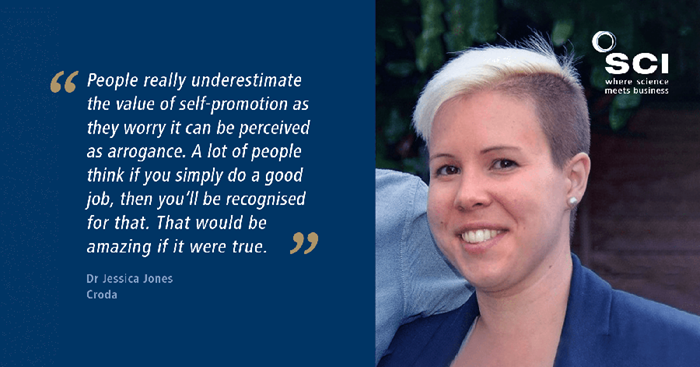
What does a general working day involve?
There are eight people in our team, and I am responsible for managing six of them. There are two other senior technical specialists I work alongside. They have lots of experience in the industry and working with academia, and the three of us coordinate the projects across the team.
My role is to translate the pipeline and the strategy from our senior leaders into what we do in the lab every day. I have three projects that I'm running, which are new product launches. Alongside that, I coordinate the project pipeline and make sure everyone is able to manage their projects and progress them. I do a small amount of lab work, but I would say it makes up 5% of my time.
I always thought I would be a specialist when I joined Croda because of my PhD and lab experience. However, over the time I’ve worked here, I started to really enjoy working with other people; and I think I probably realised I had better skills at motivating other people, building up teams, and networking. So that became a lot more important, and I chose to move into the management side of things but still within a technical function.
Interpersonal skills are sometimes underrated in management. How do you approach this side of the job?
I think I am quite at ease around other people as I am very extroverted. I think that makes me different from a lot of people in my team. For example, my boss and I are the total opposite of each other, but it works really well because it means that we complement each other perfectly. He’s very strategic and he likes to take his time to make decisions. He likes to review all the data very methodically and is good at using detail to evaluate a project’s true value, whereas I’m much more about talking to people, bringing everyone together and acting quickly to get things done. But I think the balance of both works incredibly well for us as a team.
During lockdown we received a webinar on personal resilience, and the session was about your outward projection to other people. About 70% of how you are perceived by others is made up of how people see you and your ‘brand’. Your technical expertise and actual ability to do your job only makes up about 20% of how people view you and how successful you are. And I think as a scientist, you get a bit focused on delivering the project successfully, thinking that you need to be really amazing at delivering data, but people forget about the need to work on themselves to develop as well.
What part of your job motivates you most?
It’s a combination. The science we’re working on is very exciting, and I really enjoy getting all the projects together, making sure everything fits together and that everyone’s doing the right thing. But emotionally, it’s the team that gets me up in the morning – coming in, seeing what they do, how they have been. I’ve been really lucky over the past 12 months, being able to see some of my colleagues really develop. I’ve taken a lot of pride in realising the impact you can have on other people and allowing yourself to take credit for that.
>> What is life like as a materials scientist? Take a look at our thought-provoking conversation with Rhys Archer, founder of Women of Science.
Which mentors have helped you along the way?
There’s one person who stands out. I was asked to take on this extra role to become a European technical rep in one of our business areas. I’d never done anything like that before so the idea that I was going to be put out there, in front of customers, as the technical expert for the business was quite terrifying.
I was to work with the European Sales Manager of the business, and we ended up traveling a lot together. He was the opposite to me. He’s very experienced but had a reputation as a bit of a loud, burly Yorkshireman and I wasn’t sure how we would fit together, but we got on like an absolute house on fire. He was so helpful to me, not just in giving feedback on what I was doing in the role, but general conversations about career and life outside of work and personal support. Having that kind of professional relationship develop has made a massive difference. Just meeting someone like that and having a person to go to when I needed help, someone who I really trust to have my best interests at heart. It was very beneficial for the number of years that we worked together. Since then, we have moved on to different roles, but we still stay in touch, and it has taught me the value in reaching out to different people to help me to develop.
Jessica with the first product she developed at Croda.
In terms of equality and diversity, do you think enough is being done in your sector?
I think there is always more that can be done but I’ve never felt my gender has hindered me in my career and I’ve always felt very supported at Croda. Sometimes people are in a rush to see change immediately, especially when the senior management at Croda and many other STEM organisations is still made up of a majority of white males.
I like to think that the support myself and others have been given will mean that, as we progress, there will be more representation in senior positions. I would always want to achieve something on merit rather than to tick a box for equality. If that means it will take time for the generation I am in now to get to those positions, then I can wait. Importantly, I genuinely think everything that’s being put in place at Croda, and more broadly across the STEM sector, will pave the way for more diverse representation in senior roles in the future.
Do you have any advice you’d give to someone starting out?
Having a mentor is very important. I never thought I needed one until accidently developing that relationship. Since moving into different roles, I’ve set out to deliberately engage with people for that purpose. I would encourage people to seek out those who are different from themselves and engage with them.
I also think it’s important not to be afraid to ask for things you want. If you want to get a promotion or seek out further development, it’s often tempting to ask permission. If you can demonstrate to people that you are ready, it is more effective.
Generally, I think people, especially women, really underestimate the value of self-promotion as they worry it can be perceived as arrogance. A lot of people think that if you simply do a good job, then you’ll be recognised for that. That would be amazing if it were true, but people will judge you on how you’re perceived and how you present yourself, as well as what you do.
I think you need to put yourself out there. Whether it’s getting involved in something outside of your day job or taking the lead in a particular task, it’s a great way to get recognised. Sometimes it won’t work out and it can be hard to take the criticism when that happens, but you always learn from the outcome. I always prefer to have given something a go, even if I fail, than never to try.
Finally, I think people should always be themselves because everyone has unique skills to offer. I don’t think people would look at me and think that I look like the manager of a technical team, but I’m comfortable with my own style and that makes other people comfortable with it too.
>> We’re always interested in hearing about different people’s diverse career paths into chemistry. If you’d like to share yours, get in touch with us at: eoin.redahan@soci.org

